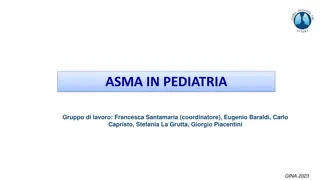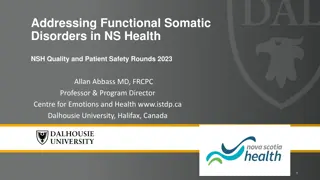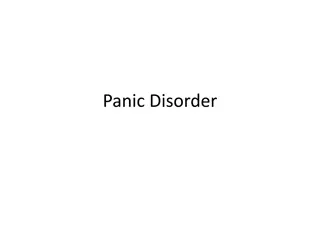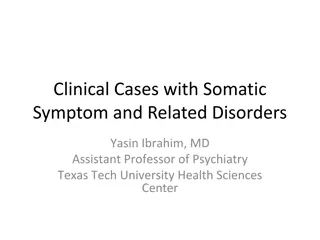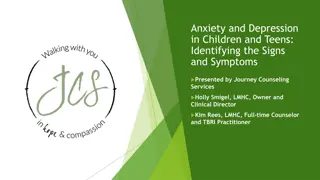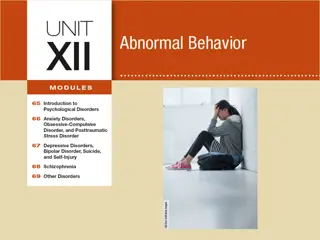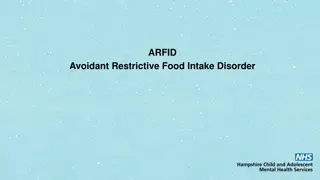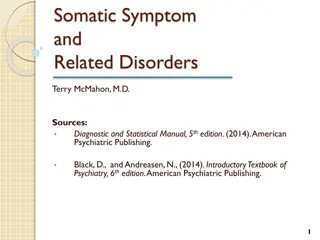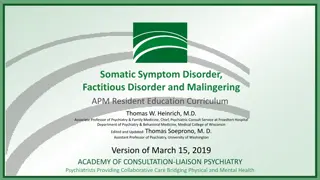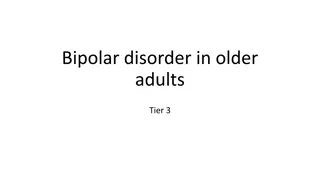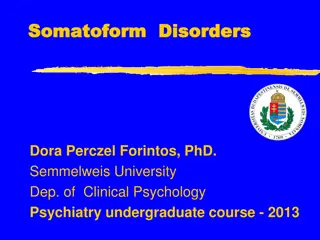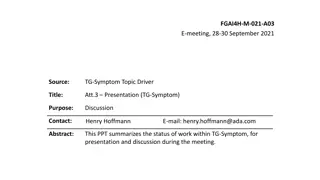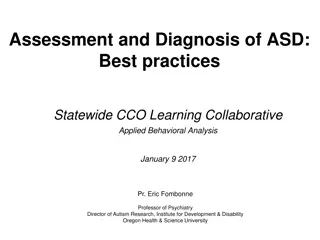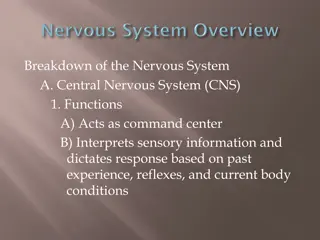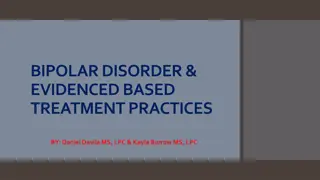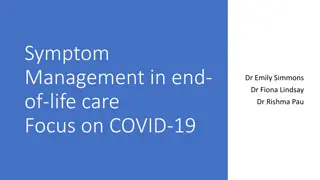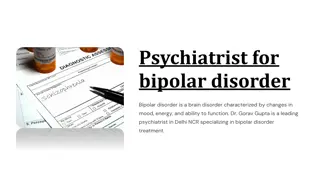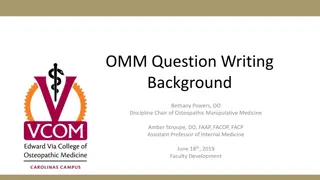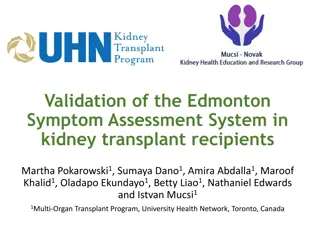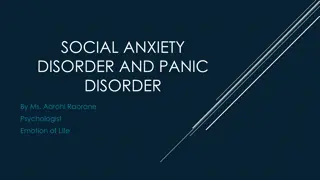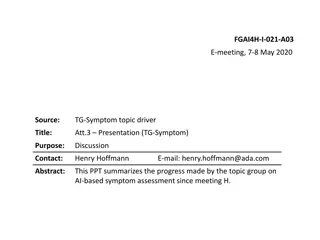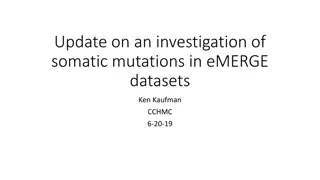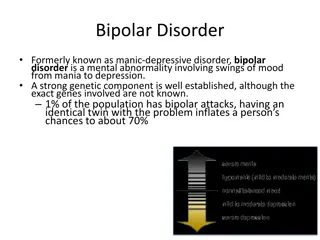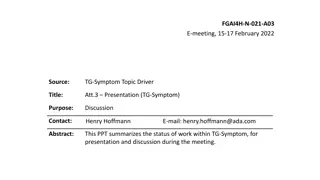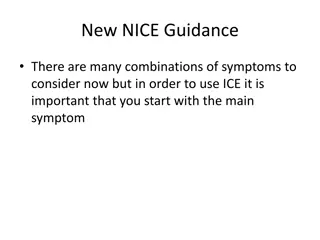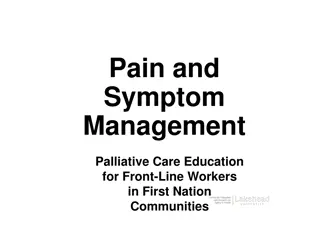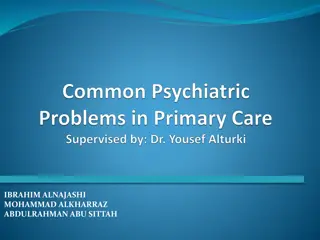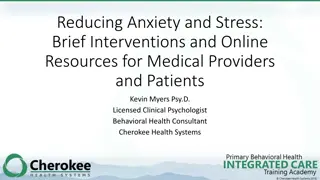ASMA IN PEDIATRIA
Pediatric asthma guidelines for children aged 5 years and above, outlining diagnosis criteria, symptom patterns, and treatment recommendations based on GINA 2023. The content covers characteristics suggestive of asthma, including recurrent non-productive cough, wheezing, and shortness of breath, and
3 views • 30 slides
Addressing Functional Somatic Disorders in Patient Safety Rounds
Explore the burden of functional somatic symptoms in NS Health, delve into emotional factors contributing to somatic symptoms, and learn about evidence-based short-term talking therapy for functional somatic disorders. Gain insights from reference materials and data on unexplained symptoms and emerg
3 views • 29 slides
Approach to Depression in Primary Care by Dr. Jon Davine
In this presentation, Dr. Jon Davine discusses the approach to depression in primary care, covering topics such as differential diagnosis, antidepressant medication selection, augmentation techniques, and treatment options like ECT and TMS. The sad state is explored through differential diagnoses, i
5 views • 56 slides
Somatic Exercises for Anxiety - trinexpharmacy.com
Somatic Exercises For Anxiety against an invisible enemy. Itu2019s exhausting, and often, traditional methods of managing it donu2019t always work. This is where somatic exercises come in. But what exactly are somatic exercises? Contact : 1 (747) 209 u2013 3649 E-mail : sales@trinexpharmacy.com
2 views • 7 slides
Understanding Panic Disorder: Symptoms, Diagnosis, and Management
Panic disorder is characterized by sudden, intense surges of fear or discomfort known as panic attacks. Individuals with this disorder may experience symptoms like chest pain, shortness of breath, dizziness, and a fear of having a heart attack. Differential diagnosis includes conditions like coronar
0 views • 8 slides
Understanding Anxiety Disorders and Related Conditions
Explore the distinguishing features of anxiety disorders such as generalized anxiety disorder, panic disorder, and phobias, along with insights into obsessive-compulsive disorder (OCD) and posttraumatic stress disorder (PTSD). Delve into the impact of conditioning, cognition, and biology on these co
2 views • 46 slides
Complex Case Study: Chronic Pain and Somatic Symptom Disorder
Michelle Adams, a 51-year-old hairdresser, presents with severe chronic back pain following a traumatic incident. Despite various treatments and medications, her pain persists, leading to distress and functional impairment. Her symptoms align with Somatic Symptom Disorder (SSD) with predominant pain
0 views • 50 slides
Understanding Anxiety and Depression in Children and Teens
This presentation by Journey Counseling Services delves into identifying signs and symptoms of anxiety and depression in children and teens. Topics include the different components of anxiety, common signs and symptoms, and various types of anxieties such as phobias, separation anxiety, generalized
1 views • 11 slides
Understanding Depressive Disorders and Bipolar Disorder
Depression is prevalent among students and individuals in the US. Major depressive disorder and persistent depressive disorder are characterized by varying degrees of depressive symptoms lasting for different durations. The diagnostic criteria include signs of depression persisting for specific peri
1 views • 57 slides
Understanding ARFID: A Guide to Avoidant Restrictive Food Intake Disorder
Avoidant Restrictive Food Intake Disorder (ARFID) is a feeding and eating disorder characterized by significant weight loss, nutritional deficiency, and psychosocial impairment. Individuals may experience sensory sensitivity, lack of interest, or fear of aversive consequences. ARFID differs from pic
0 views • 18 slides
Understanding Somatic Symptom Disorders, Conversion Disorders, and Dissociative Disorders
Somatic symptom disorders manifest as physical symptoms without apparent cause, while conversion disorders involve specific physical symptoms incompatible with medical conditions. Illness anxiety disorder involves interpreting normal sensations as disease symptoms. Dissociative disorders lead to a s
1 views • 41 slides
Understanding Somatic Symptom and Related Disorders
Exploring the key features, diagnostic criteria, contributing factors, and management principles of Somatic Symptom and Related Disorders. This comprehensive guide covers the clinical manifestations, co-morbidities, and treatment approaches associated with these disorders, shedding light on somatic
2 views • 38 slides
Understanding Somatic Symptom Disorder and Related Disorders
This educational material delves into Somatic Symptom Disorder, Factitious Disorder, and Malingering, emphasizing the importance of accurate diagnosis and management. It explores various aspects, including symptoms, classifications, and implications in bridging physical and mental health. The conten
0 views • 91 slides
Understanding Bipolar Disorder in Older Adults
Bipolar disorder in older adults can have a later onset, often after the age of 50, with episodes of mania and depression. Recognizing symptoms like excessive energy, inability to sleep, and cognitive impairment is crucial. Late-onset bipolar disorder differs from early-onset in familial illness rat
1 views • 12 slides
Understanding Co-occurring Mental and Physical Health Conditions
Co-occurring mental and physical health disorders are prevalent and require an integrative multidisciplinary approach for effective assessment and treatment. This holistic approach helps address the complexity of managing multiple disorders in an integrated healthcare setting. Through a multi-direct
1 views • 37 slides
Effective Strategies for Children with Developmental Language Disorder, Sensory Processing Disorder, and Fine Motor Delays
Children with Developmental Language Disorder (DLD), Sensory Processing Disorder (SPD), and Fine Motor Delays often have accompanying sensory and fine motor deficits. Research indicates that addressing sensory processing deficits can significantly benefit children with DLD, ADHD, autism, and other d
0 views • 61 slides
End-of-Life Symptom Management for COVID-19 Patients: A Comprehensive Guide
This comprehensive guide focuses on symptom management in end-of-life care for COVID-19 patients, covering identification of signs of dying, communication with residents and families, recognition of end-of-life symptoms, and pharmacological/non-pharmacological approaches. It also provides valuable r
0 views • 19 slides
Human Disease Symptom Network: Understanding Disease Relationships Through Symptoms and Genes
The Human Disease Symptom Network (HSDN) is constructed using a large-scale medical bibliographic records database to form a network of human diseases based on symptom similarities. By integrating disease-gene associations and protein-protein interaction data, correlations between symptom similarity
0 views • 37 slides
Understanding Somatoform Disorders: Symptoms, Diagnosis, and Treatment Options
Somatoform disorders are characterized by physical symptoms that mimic general medical conditions without an underlying medical or mental disorder. Patients often exhibit somatic symptoms without an organic basis, have poor insight, and do not find reassurance helpful. Common types include somatizat
0 views • 46 slides
Progress Report on AI-Based Symptom Assessment in Healthcare
This report provides an overview of the advancements in AI-based symptom assessment for healthcare applications. It covers the discussion points from the recent e-meeting, presentation updates, and the current status of benchmarking systems and ontology work within the Topic Group Symptom. The focus
1 views • 11 slides
Understanding Autism Spectrum Disorder: Assessment, Diagnosis, and Characteristics
This content delves into the assessment and diagnosis of Autism Spectrum Disorder (ASD) with a focus on early markers, DSM-5 criteria, language/communication abnormalities, social interaction abnormalities, and repetitive behaviors/unusual interests. It provides a comprehensive overview of the key a
0 views • 20 slides
Overview of the Nervous System Components and Functions
The nervous system is comprised of the central nervous system (CNS) and the peripheral nervous system (PNS). The CNS acts as the command center, interpreting sensory information and coordinating responses. The PNS conveys information to and from the CNS through somatic and visceral sensory neurons,
0 views • 48 slides
Boise Bible College Fall 2020 Covid-19 Guidelines
Boise Bible College's Fall 2020 Covid-19 guidelines prioritize face coverings, physical distancing, hand hygiene, and symptom monitoring. These guidelines emphasize flexibility and grace while aiming for the safety and well-being of the college community. Measures such as mandatory face coverings, s
0 views • 9 slides
Understanding Bipolar Disorder and Evidence-Based Treatment Practices
This presentation by Daniel Davila, MS, LPC, and Kayla Burrow, MS, LPC delves into the complexities of bipolar disorder, potential crisis outcomes, and mental illness management through evidenced-based treatment practices. Topics covered include bipolar diagnosis, assessing disorder lethality, treat
0 views • 44 slides
Exploring Damage-Related Protein Turnover in Relation to Somatic Maintenance in the DEB Theory
Unraveling the intricacies of somatic maintenance, this study delves into the role of protein turnover in explaining inter-specific maintenance rate patterns within the Dynamic Energy Budget (DEB) framework. Empirical observations shed light on the metabolic processes involved in maintaining organis
0 views • 14 slides
Symptom Management in End-of-Life Care: Focus on COVID-19
Review signs of dying, communicate effectively with residents and families, identify end-of-life symptoms (especially related to COVID-19), and explore non-pharmacological and pharmacological approaches for symptom management. Resources and guidance are provided for caring for individuals in the com
0 views • 19 slides
Psychiatrist for bipolar disorder
Bipolar Disorder is a brain disorder characterized by extreme mood changes; manic or hypomanic episodes and mixed episodes with depressive episodes. In the following blog post, the best psychiatrist for bipolar disorder treatment, Dr. Gorav Gupta, el
0 views • 7 slides
Overview of Osteopathic Medicine: History, Somatic Dysfunctions, and Treatments
Osteopathic Medicine, pioneered by Dr. Andrew Taylor Still in 1874, focuses on treating illness within the context of the whole body. The history of osteopathic medicine, including challenges faced by D.O.s, and the concept of somatic dysfunctions are explored. Somatic dysfunctions refer to restrict
0 views • 19 slides
Understanding Plant Tissue Culture and Regeneration Pathways
Plant tissue culture techniques such as Organogenesis and Somatic Embryogenesis play a crucial role in regenerating whole plants from meristem cells. The process involves the formation of organs directly from explants or callus structures and the production of adventitious organs like roots, shoots,
1 views • 34 slides
Validation of the Edmonton Symptom Assessment System in Kidney Transplant Recipients
Patient-reported outcomes play a crucial role in understanding the symptom burden and quality of life in chronic kidney disease patients, including kidney transplant recipients (KTRs). This study assesses the validity and reliability of the Edmonton Symptom Assessment System in KTRs, focusing on phy
0 views • 21 slides
Understanding Social Anxiety Disorder and Panic Disorder
Social anxiety disorder and panic disorder are common mental health conditions characterized by intense feelings of fear and anxiety in social situations. Individuals with these disorders may experience physical symptoms such as trembling, racing heart, and upset stomach, along with emotional signs
0 views • 18 slides
Update on AI-Based Symptom Assessment Progress
This presentation summarizes the progress made by the topic group on AI-based symptom assessment since the E-meeting held on 7-8 May 2020. It covers the AI task related to symptom assessment, the journey and approach of the group so far, and the current status of the topic group members and contribu
0 views • 9 slides
Comprehensive Analysis of Somatic Mutations in eMERGE Datasets
This investigation delves into somatic mutations across normal tissues, revealing macroscopic clonal expansions. The study processed a large number of samples and identified candidate mutations, with characteristics and functional predictions detailed. Genes with the most somatic mutations are highl
0 views • 24 slides
Understanding Mental Health Disorders: Bipolar Disorder, Anxiety Disorders, & More
Exploring various mental health disorders such as Bipolar Disorder, Anxiety Disorders, Generalized Anxiety Disorder, Panic Disorder, and Phobic Disorders. Learn about their symptoms, prevalence, and impacts on individuals' lives.
0 views • 41 slides
AI-Based Symptom Assessment Applications in Healthcare
The presentation highlights the status of work within TG-Symptom for discussion during the e-meeting. It covers AI-based symptom assessment mobile/web applications, pre-clinical triage, and differential diagnosis. The meeting provides updates on symptom assessment and benchmarking approaches within
0 views • 13 slides
Updated Guidance on Colonic Imaging Tests for Various Symptoms
The new NICE guidance outlines recommended tests based on different symptom complexes, emphasizing the importance of starting with the main symptom, such as rectal bleeding or abdominal mass. Specific tests like flexible sigmoidoscopy, colonoscopy, or CT scans are suggested depending on age and fitn
0 views • 5 slides
Comprehensive Guide to Pain and Symptom Management in Palliative Care Education
Explore a comprehensive guide on pain and symptom management in palliative care education, emphasizing the importance of effective care plans and team participation. Learn about different types of pain, perception variations, and total pain factors affecting end-of-life care in First Nation communit
0 views • 28 slides
Cancer Symptom Trials Telehealth Challenges Workshop
Cancer Symptom Trials Telehealth Challenges Workshop held on 8th December 2020 addressed various clinical challenges in telehealth, including how they impact clinicians and patients. The workshop focused on cancer symptoms, evidence, gaps in research, and a proposal for future studies.
0 views • 5 slides
Understanding Anxiety, Depression, and Somatic Symptom Disorder in Saudi Arabia
This content discusses the prevalence, etiology, clinical features, and management of anxiety, depression, and somatic symptom disorder in Saudi Arabia. It also covers the importance of counseling and psychotherapy in family medicine settings and knowing when to consult a psychiatrist. The content i
0 views • 50 slides
Understanding Anxiety Disorders and Stress Management
Anxiety disorders, such as Generalized Anxiety Disorder and Panic Disorder, are common in medical settings and often coexist with various medical conditions. Patients with anxiety may also experience somatic symptoms like heart palpitations and sleep disturbances. The DSM-5 criteria for Generalized
0 views • 17 slides
